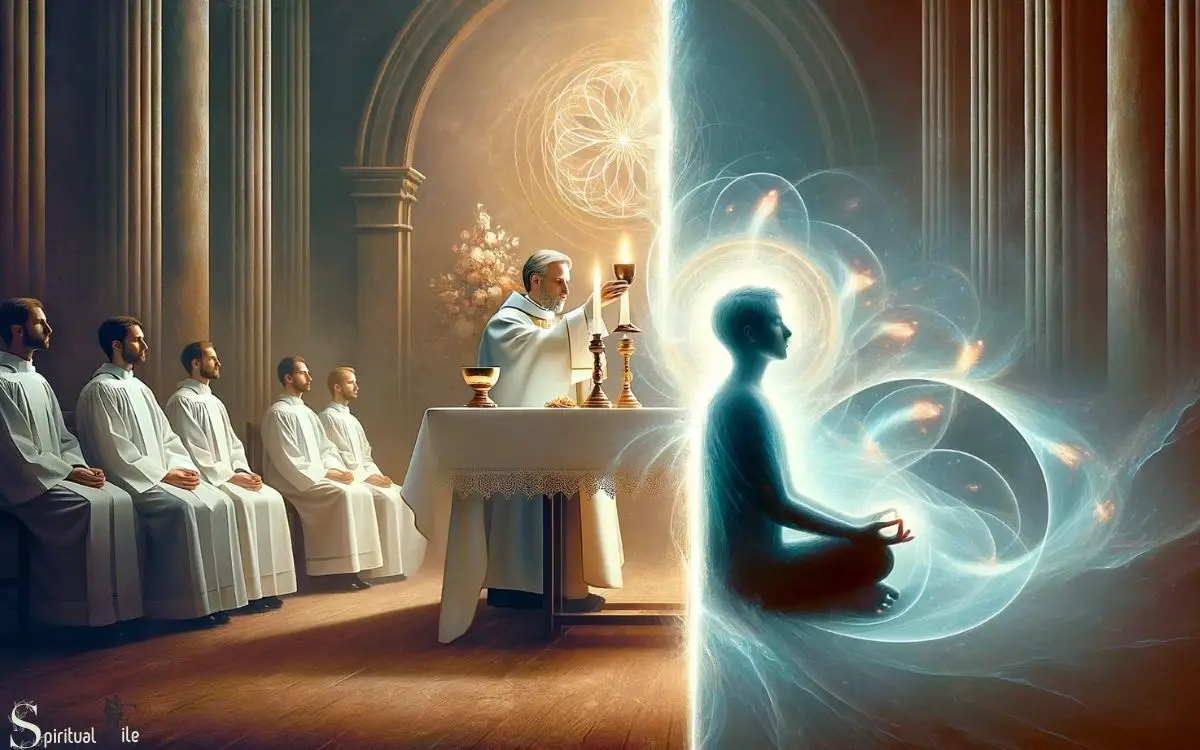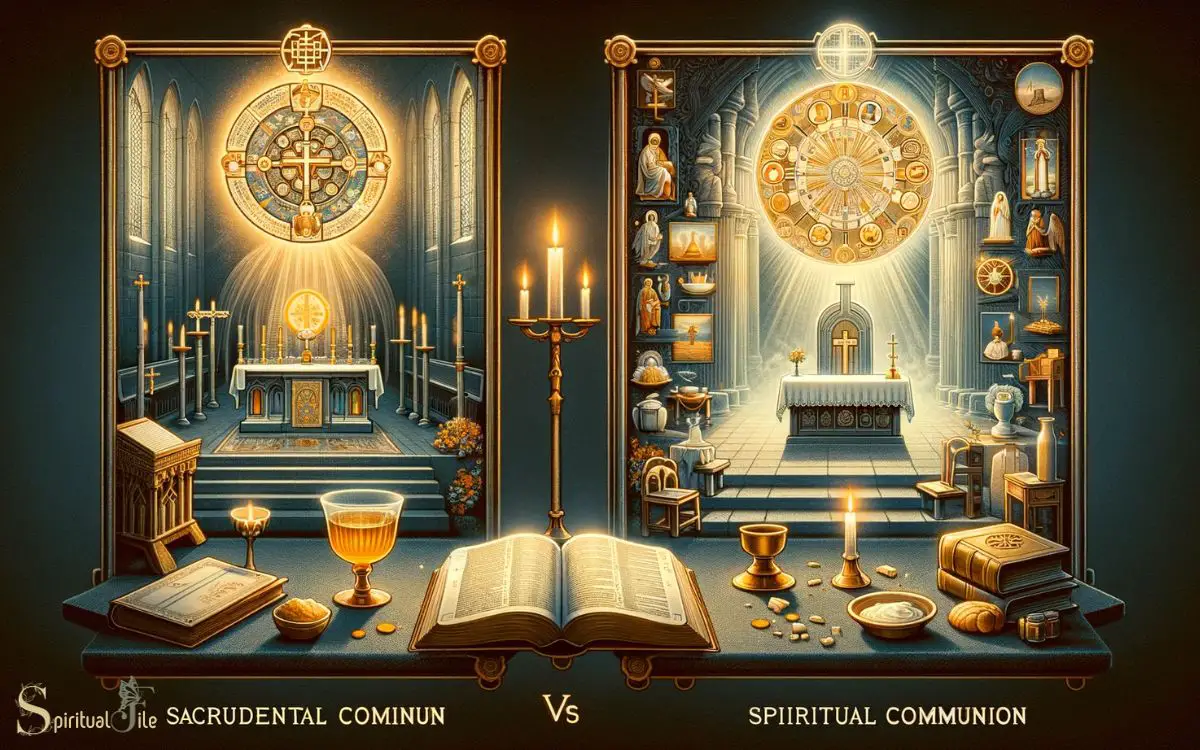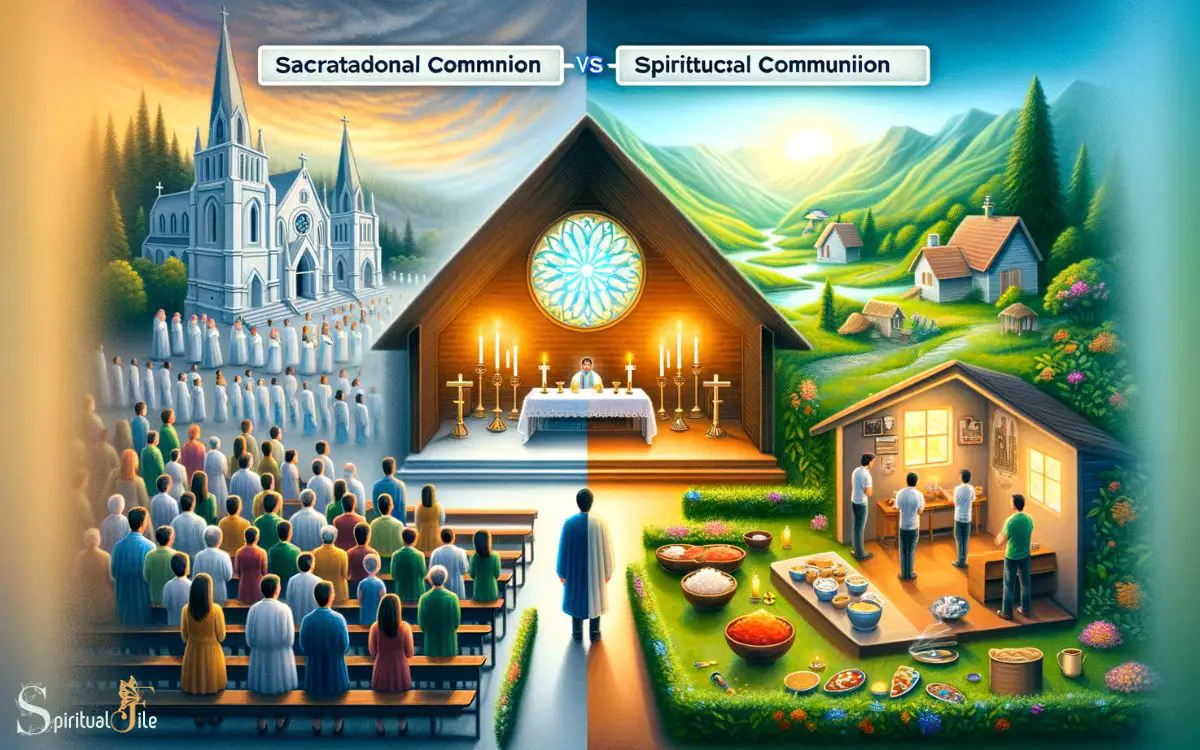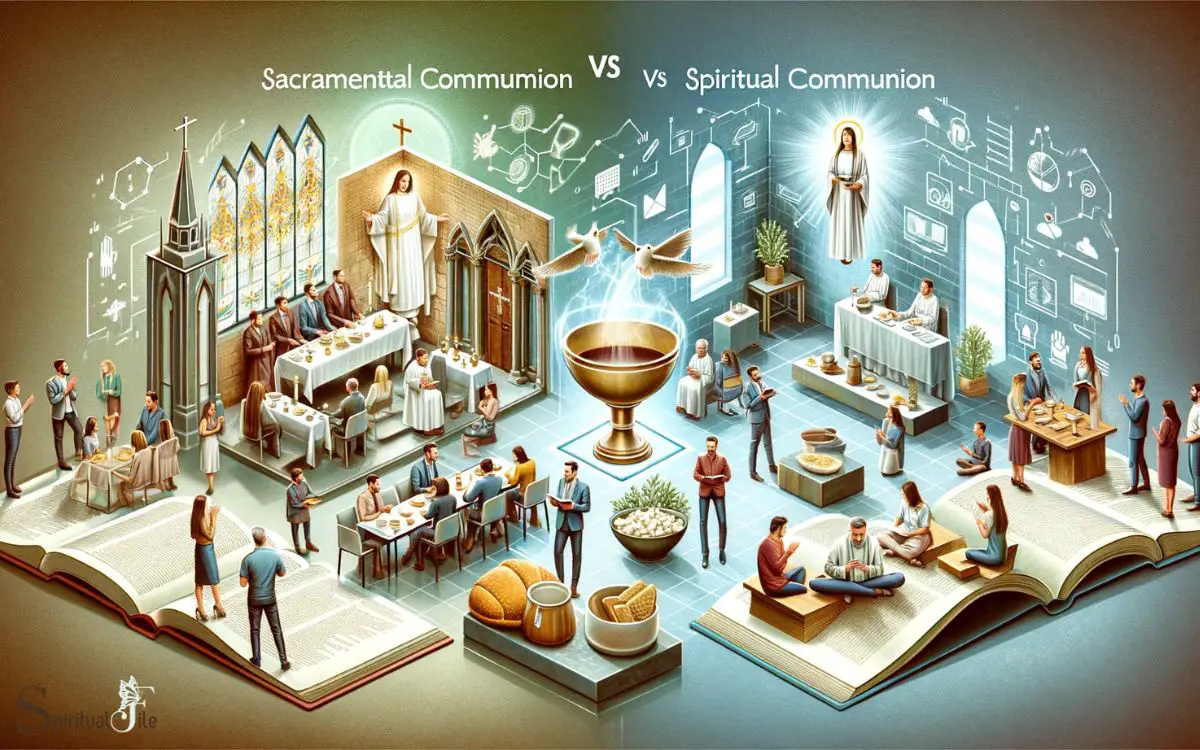Sacramental Communion Vs Spiritual Communion: Prayers!
Sacramental Communion involves the physical act of consuming consecrated bread and wine, believed to be the body and blood of Christ, as part of a Christian religious ceremony.
In contrast, Spiritual Communion is a devotional practice for those who cannot partake in the Eucharist physically. It involves a heartfelt desire to receive the sacrament, accompanied by prayers, reflecting one’s faith and desire for union with Christ.
Sacramental Communion and Spiritual Communion are both significant in Christian worship but serve different purposes and contexts.
Here are some Communion:
Sacramental Communion:
- Physical ingestion of consecrated elements.
- Administered during a church service.
- Requires presence in a worship setting.
Spiritual Communion:
- An act of devotion and prayer.
- Can be practiced anywhere, anytime.
- Serves those unable to receive sacramental communion (e.g., due to illness or lack of access to a church).
For example, a person who is homebound and unable to attend Mass can make a Spiritual Communion, expressing the desire to receive the sacrament and inviting Christ into their heart spiritually.

Key Takeaway
4 Aspects: Sacramental Communion Vs Spiritual Communion
| Aspect | Sacramental Communion | Spiritual Communion |
|---|---|---|
| Nature | Ritual, physical elements | Personal, mental focus |
| Belief | Represents real presence | Symbolic connection |
| Practice | Often in church setting | Anywhere, anytime |
| Participation | Requires a priest or minister | Individual or group-led |
Historical Origins and Development

The historical origins and development of sacramental communion and spiritual communion can be traced back to the early Christian church and have evolved over centuries.
Sacramental communion, also known as the Eucharist or Holy Communion, finds its roots in the Last Supper, where Jesus shared bread and wine with his disciples. This act became a central ritual in Christian worship, symbolizing the body and blood of Christ.
Spiritual communion, on the other hand, emphasizes a personal, internal connection with the divine, often practiced when unable to partake in the physical sacrament.
Over time, theological and doctrinal differences influenced the understanding and practice of these forms of communion, shaping the beliefs and practices of various Christian denominations.
Understanding the historical context and development of these two forms of communion provides insight into their theological significance and understanding.
Theological Significance and Understanding

The theological significance and understanding of sacramental communion versus spiritual communion encompasses the debate between sacrament and symbolism.
It also includes the nature of Eucharistic presence and the role of faith and participation in the communion experience.
These points delve into the core theological differences and implications of the two forms of communion, shedding light on the beliefs and practices that shape the understanding of this fundamental aspect of Christian faith.
Understanding these theological nuances is crucial for grasping the depth and significance of communion in its various forms within Christian traditions.
Sacrament Vs Symbolism
In understanding the theological significance of sacrament versus symbolism, it is essential to delve into the historical and doctrinal implications of each concept.
Sacrament:
- It is rooted in the belief of an actual, mystical presence of Christ.
- It is viewed as a means of grace, conveying the divine presence and power.
- It is deeply connected to the concept of Christ’s real presence in the Eucharist.
- It emphasizes the transformative nature of the elements, imparting spiritual nourishment.
- It is upheld as a sacred and efficacious act ordained by Christ Himself.
Symbolism:
- It represents a memorial or symbolic remembrance of Christ’s sacrifice.
- It focuses on the symbolic significance of the elements, representing spiritual truths. – It views the communion elements as mere symbols or representations.
- It emphasizes the symbolic nature of the ritual, highlighting its instructional value.
- It is regarded as a meaningful, but not inherently transformative, act.
Transitioning to the subsequent section about the ‘eucharistic presence debate’, these differing theological understandings lay the groundwork for the ongoing discourse regarding the nature of Christ’s presence in the Eucharist.
Eucharistic Presence Debate
An ongoing theological debate surrounds the understanding of the Eucharistic presence and its significance within Christian traditions. The debate primarily revolves around the nature of Christ’s presence in the Eucharist.
Some traditions emphasize a sacramental view, holding that the bread and wine become the actual body and blood of Christ, while others interpret the Eucharist as a symbolic remembrance of Christ’s sacrifice.
The theological significance of this debate lies in its implications for the believer’s encounter with the divine. Those who uphold the sacramental view often stress the real presence of Christ in the Eucharist as a means of experiencing communion with God.
Conversely, those who hold a symbolic view emphasize the importance of spiritual communion and the symbolic representation of Christ’s sacrifice.
This debate continues to shape the worship and theology of various Christian denominations.
Faith and Participation
Faith and participation in the Eucharist hold profound theological significance for believers. The act of communion goes beyond a simple religious ritual; it is a deeply spiritual and communal experience that shapes the identity and beliefs of individuals within the Christian faith.
Understanding the theological implications of faith and participation in the Eucharist is essential for believers seeking a deeper connection with their religion.
This understanding encompasses several key elements:
- Real Presence: The belief in the actual presence of Christ in the Eucharist.
- Sacramental Union: The union with Christ and other believers through the sacrament.
- Spiritual Nourishment: Receiving spiritual nourishment and grace through the Eucharist.
- Community Participation: Engaging in communal worship and fellowship during the Eucharistic celebration.
- Faith Expression: Expressing and strengthening one’s faith through active participation in the Eucharist.
Rituals and Practices in Sacramental Communion

The observance of rituals and practices in sacramental communion is integral to the expression of religious devotion and communal unity.
These rituals and practices, such as the Eucharist in Christian traditions, serve as tangible expressions of faith and are deeply rooted in religious history and tradition.
The act of receiving the sacrament involves specific gestures, words, and communal participation, creating a shared experience of spiritual significance.
The preparation and consumption of the elements, often bread and wine, are laden with symbolic meaning, representing the body and blood of Christ in Christianity.
These rituals and practices not only foster a sense of spiritual connection with the divine but also bind individuals together in a shared religious identity and purpose.
They provide a framework for expressing and experiencing faith within a communal setting, fostering a sense of belonging and shared commitment.
Spiritual Communion: Concept and Practice

In spiritual communion, individuals cultivate a direct and personal connection with the divine, seeking a profound sense of unity and spiritual nourishment.
This practice is often pursued when sacramental communion is not possible, allowing individuals to maintain their spiritual bond with the divine.
The concept and practice of spiritual communion encompass the following key aspects:
- Intentional Prayer: Engaging in heartfelt prayer to express a desire for spiritual union with the divine.
- Meditation and Reflection: Deliberate contemplation to foster a deeper connection with the divine presence within oneself.
- Seeking Divine Guidance: Embracing spiritual communion as a means to seek guidance, strength, and grace from the divine.
- Acts of Loving-Kindness: Demonstrating compassion, empathy, and love towards others as a way to embody spiritual communion in daily life.
- Communal Spiritual Connection: Participating in virtual or remote spiritual gatherings to foster a collective sense of spiritual communion.
Implications for Believers’ Faith and Worship

Believers’ worship practices may be influenced by their understanding of sacramental and spiritual communion. For those who emphasize sacramental communion, the physical reception of the elements is central to their faith and worship.
The tangible experience of partaking in the body and blood of Christ holds deep significance, shaping their connection to the divine.
On the other hand, those who prioritize spiritual communion may focus more on the inward, contemplative aspect of their faith. Their worship is characterized by a profound sense of spiritual union with Christ, transcending the physical elements.
These differing perspectives can lead to distinct worship styles and liturgical expressions within religious communities. Understanding these implications can foster dialogue and appreciation for the diverse ways in which believers engage in their faith and worship practices.
Contemporary Debates and Perspectives

Contemporary debates and perspectives surrounding sacramental and spiritual communion reveal ongoing discussions concerning the interpretation and application of these concepts within religious communities.
Some of the current debates and perspectives include:
- The role of technology in facilitating spiritual communion, especially in the context of virtual religious services during the COVID-19 pandemic.
- The inclusivity of spiritual communion for individuals who are unable to participate in sacramental communion due to various reasons such as health issues or geographical constraints.
- The theological implications of prioritizing one form of communion over the other in different denominations.
- The evolving understanding of the symbolic and transformative nature of sacramental communion in contemporary religious thought.
- The intersection of sacramental and spiritual communion with social justice and ethical concerns in modern society.
Is Sacramental Communion Necessary for Spiritual Fulfillment in Prayer?
When it comes to spiritual vs religious beliefs prayer, the question of whether sacramental communion is necessary for spiritual fulfillment is debated. Some believe it is integral for a deeper connection with the divine, while others find spiritual fulfillment through different means of prayer and connection with their higher power.
FAQ of Sacramental Communion Vs Spiritual Communion
How Does the Practice of Sacramental Communion Differ Between Different Christian Denominations?
The practice of sacramental communion differs among Christian denominations due to varying beliefs about the nature of the Eucharist, including transubstantiation, consubstantiation, and symbolic representation.
These differences impact the liturgical celebration and theological understanding of communion.
Are There Any Specific Prayers or Rituals Associated With Spiritual Communion?
Specific prayers or rituals associated with spiritual communion vary among Christian denominations.
They often involve a prayer expressing the desire to receive Christ spiritually and a moment of reflection on the presence of the divine.
How Does the Concept of Spiritual Communion Relate to the Idea of the Presence of Christ in the Eucharist?
The concept of spiritual communion underscores the profound connection between the individual and the divine presence.
It delves into the spiritual nourishment and closeness to Christ, complementing the idea of his presence in the Eucharist.
Can Individuals Who Are Unable to Physically Participate in Sacramental Communion Still Receive the Same Spiritual Benefits?
Individuals who are unable to physically participate in sacramental communion can still receive the same spiritual benefits through the practice of spiritual communion.
This allows for a connection with the divine and the reception of grace.
Are There Any Historical Examples of Individuals or Communities Practicing Spiritual Communion in Times of Crisis or Persecution?
During historical crises or persecution, individuals and communities have often practiced spiritual communion as a means of connecting with the divine and receiving spiritual benefits,
Even when unable to physically participate in sacramental communion. This practice has deep historical roots.
Conclusion
The comparison between sacramental communion and spiritual communion reveals the rich historical and theological significance of both practices.
While sacramental communion emphasizes the physical rituals and practices, spiritual communion focuses on the inner spiritual connection with the divine.
Both have implications for believers’ faith and worship, and contemporary debates continue to explore the significance of these practices in the modern religious context.
Understanding the differences and similarities between these two forms of communion is essential for a deeper appreciation of the spiritual life.






